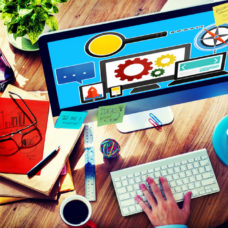The 241st American Independence Day is here! How will 4th of July celebrations change in the foreseeable future?
Happy Independence Day, Americans! Also, thanks France 🙂
It’s been 241 years since the Continental Congress ratified the U.S. Declaration of Independence and began setting the U.S. free from British control. Since then, Americans marked this most prominent holiday with festivities that are now synonymous with the 4th day of July.
Each year, this day is officially celebrated by the whole nation. Fireworks crash all evening, some people sing the “Star-Spangled Banner” but mostly it’s Garth Brooks.
There are parades, too, but there’s nothing that says 21st century American Independence Day like a backyard barbecue with friends and family.
These traditional festivities haven’t significantly changed since the 18th century, and while they could still retain their essence in the future, new technologies and scientific breakthroughs could alter the way they are made or experienced.
How about grilling on a smart grill? Don’t be the guy that scorches the steaks–let your phone tell you when it’s time to flip the meat!
Heck, soon you might be flipping laboratory meat on the grill.
Some technologies, such as AI, Deep Leaning (they’re not the same!), VR/AR, and drones, are already reshaping many elements of daily life. Who knows what they could to do our most important holidays.
Here are 4 Ways the Fourth of July Will Look Different in the Future:
1. Next-gen Fireworks
“It ought to be solemnized with pomp and parade,” wrote John Adams in a letter to his wife about the 4th July after the proclamation of U.S. independence, “with shews, games, sports, guns, bells, bonfires and illuminations (fireworks) from one end of this continent to the other.”
The following year, in 1777, Boston started the tradition with the first “illuminating” show, and since then fireworks became a staple of the celebrations.
Computers are already used to improve fireworks, by designing, synchronizing, and simulating their displays. However, most fireworks are still pretty much the same: a shell full of gunpowder.
Pyrotechnic entertainment would change in the coming years to increase the wow-factor by adopting other existent technologies, like drones. Computer-synched swarms of drones could be lit up in the sky to create dazzling shows. Intel has already done it, using 500 drones!
Scared of going to sketchy looking firework stands? Just 3D print your own.
2. The Star-Spangled Banner
When the U.S. Civil War broke out, the flag started being waved and flown as a symbol of belonging and patriotism. Celebrating a Happy Independence Day was for more than just a successful revolution–it was an effort to empower the Union.
While its true origins remain debatable, the U.S. flag was adopted in its current form in 1777, with the stripes honoring the 13 colonies and stars for states. Originally counting 15, more stars were added periodically as new states joined the union, with the last being added back in 1959.
This could happen again. Puerto Rico might one day become the 51st state, as 97% (out of 23% of Puerto Ricans who voted) of ballots support statehood.
On the other hand, some stars could be removed. In 2012, 21 U.S. states were involved in the “Secession Movement.” Despite no states seceding due to Barack Obama’s controversial presidency, as many threatened to do, U.S. political divisions are as wide as they’ve ever been. You’d hate to think of the future as containing a civil war, but it’s possible.
Either way, when the number of stars does change, let’s just have an AI algorithm decide the best shape of stars and stripes to fit them into a coherent and neat design.
And while we’re at it, we might also get an AI to tweak the National Anthem’s lyrics or melody or both to make it more accessible to average singers. According to experts, the national anthem (official since 1931) is pretty hard to sing, as it should be, because it was composed for trained vocalist.
Don’t think computers have the chops to write catchy tunes? Sony’s CSL Research Laboratory has showcased an AI that wrote two pop songs.
3. Fire up That (In-Vitro) Steak!
May is the National Barbecue Month, but the 4th July that takes the honor of the most popular grilling day. Few family gatherings compete with the convivial atmosphere of backyard grilling.
Future grills and smokers won’t probably change that much, but likely they would be part of the home’s IoT network, and wouldn’t run on gas. It’s “what you grill” that might change.
The steaks you grill might soon have been lab-grown, instead of harvested from animals (cows might also celebrate a Happy Independence Day), as in-vitro meat and other “meatless” protein alternatives would become available and common.
The same for sides, as veggies, corn, tomatoes and bell peppers could also come from a vertical farm.
4. Live VR Concerts and Parades
Live VR concerts are already a reality. Startups are developing solutions that allow access to concerts via a VR headset.
In a not so distant future, VR headsets will allow you to attend parades and concerts during the 4th of July holiday from the comfort of your couch. You won’t have to worry about transportation, accommodations, or traffic.
Use VR to fight the revolution this July 4th! #USAClick To TweetBut why stop there? Why not strap on a headset and go back in time to fight in the U.S. Revolutionary War? Perhaps you’ll even be able to play online against British players donning those famous red coats.
Or, maybe the best VR cocktail party would be one where your friends get together and reenact the signing of the Declaration of Independence?
Happy Independence Day, Edgy Lab U.S. readers!


















Comments (0)
Most Recent